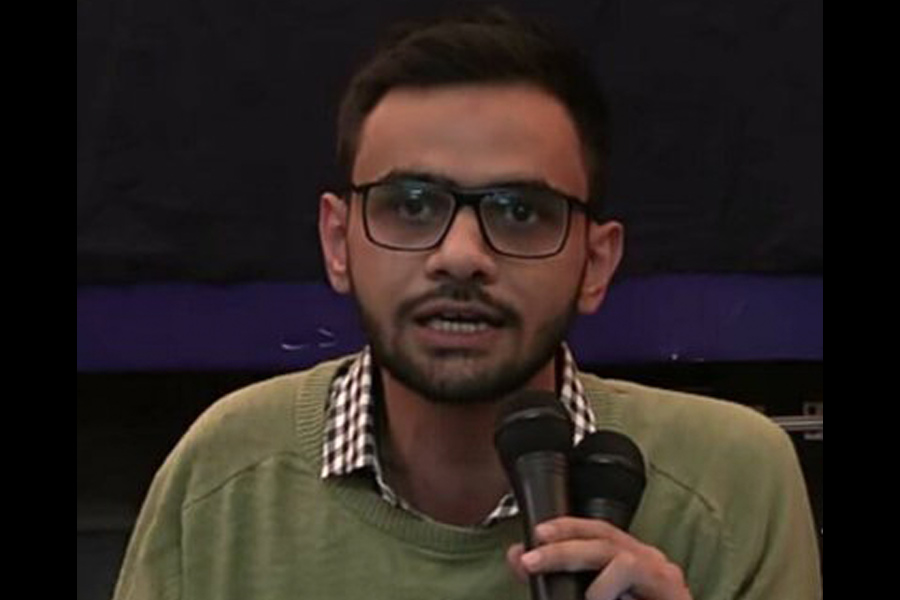Last month Anubrata Mondal, whose claim to fame is muscle-flexing during elections and alleged involvement in a cattle-smuggling racket in Bengal, was granted bail by the Rouse Avenue court of Delhi after two years in Tihar Jail.
On Friday, AAP leader and Delhi minister Satyendar Jain was granted bail by the same court after spending two years in the same jail.
The same maximum security prison is where a PhD scholar has spent 1,500 days without trial since Delhi police arrested him in September 2020.
His name is Umar Khalid.
“In 1,500 days, one can complete graduation, get experiences in jobs to move on, rusty teenagers turn into adults, scientific experiments might conclude. 1,500 days is a long time. That’s how long Umar and others are in jail, without trial, without bail,” Banojyotsna Lahiri, Umar’s partner who gets to visit him once a week, wrote on Monday afternoon.
On Monday, the 1,500th day of Umar’s incarceration, many netizens and activists raised the demand to free Umar Khalid.
Among those who reposted Lahiti’s post on X was the historian Ramachandra Gua.
The day AAP’s Satyendar Jain was granted bail by the Delhi court, a top BJP leader from Bengal in a private gathering had expressed his opinion clearly on bail.
“Bail is the rule, not exception. [Anubrata] Mondal had spent over two years behind bars. In his case the maximum punishment is up to six years. The CBI should complete its investigation and the case should go to trial,” the BJP leader said.
Umar has been denied that exception, not once but over 14 times. A sessions court has rejected his bail twice, the Delhi high court once.
Chief Justice of India DY Chandrachud’s “legacy will be that Umar Khalid and Elgaar Seven are still in jail but Jaggi and Ram Rahim are not. The latter gets so much parole that he’s not really in jail,” wrote Gaurav Sabnis, an associate professor at the Stevens Institute of Technology in the US.
For months, people from different sections of the society have been trying to draw the judiciary’s attention towards the continued denial of bail to Umar and others accused in the Delhi riots.
“Umar Khalid has been in jail for four years without trial. The charges against him are demonstrably absurd. Does the dictum of bail being the rule, jail the exception not apply to him, especially when there is no chance of trial being over in a reasonable time. This is a huge blot on the judiciary,” lawyer-activist Prashant Bhaushan wrote a month ago on his X handle.
Activist Kavita Krishnan, in a video message earlier, had described Umar’s denial of bail and trial as a test of democracy.
“When the British were in power, they would arrest anyone and put them behind bars on charges of sedition. Post-independence, every citizen has got their rights, there can be no imposition of will. Maybe people have forgotten four years have passed since Umar was arrested, some people even longer,” Krishnan had said.
“The courts have said they did not provoke anyone, they were only asking people to protest. There was no question of any terrorist activity. Yet, they have been booked under the so-called anti-terrorist Unlawful Activities Prevention Act [UAPA]. Getting a bail in UAPA cases is almost impossible. It starts with denial of bail and trial. In a democracy can anyone be kept behind bars for four years without their guilt being proved? This is a test for democracy,” she had said.
In an event last month, stand-up comedian Kunal Kamra, a vocal critic of the Narendra Modi government, had minced no words.
“I am a Hindu, therefore I am here in front of you, speaking. If I were a Muslim I would have been in the photo like Umar Khalid and others,” Kamra had said,
The Delhi police had accused Umar of being the “key conspirator” in the riots of 2020 in the national capital that left 53 people dead following months of massive protests against the contentious Citizenship Amendment Act and the National Register of Citizens. He was the last among the 20 people arrested by the Delhi police.
Also arrested was Sharjeel Imam, one of the spearheads of the Shaheen Bagh protests against the citizenship law – the rules of which were framed ahead of the Lok Sabha polls by the Narendra Modi government.
The Delhi police had lodged two cases against Umar, one of which was dropped and in the other he is yet to be charged. The courts have continued to deny him bail.
Two years ago, a former Supreme Court judge, three retired high court judges and a former Union home secretary examined the UAPA case against Umar and observed, they could not find any substantiating evidence to warrant the imposition of terrorism charges.











